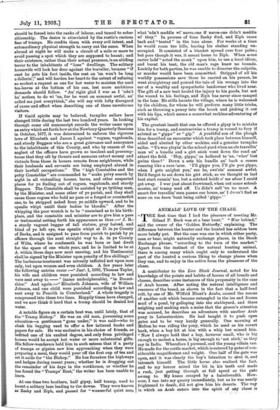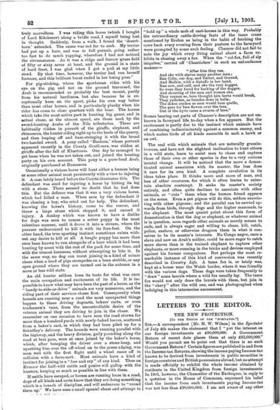ANIMALS' LOVE OF THE CHASE.
" THE first time that I had the pleasure of meeting Mr.
Gilead P. Beck was at a bear hunt." " B'ar behind," said the owner of the ' Golden Butterfly,' explaining. The difference between the hunter and the hunted has seldom been more briefly put. But the case was one in which either party, man or bear, might naturally exchange places, in the Stock Exchange phrase, "according to the turn of the market." Apart from the instinct of the natural hunting animal, there is among many which ought only to understand the part of the hunted a curious liking to change places when they can, and to enjoy in the active form the pleasures of the chase.
A contributor to the Live Stock Journal, noted for his knowledge of the points and habits of horses of all breeds and classes, describes some instances of this propensity in the case of Arab horses. After noting the natural intelligence and resource of the breed, as shown in the fact that a half-bred colt, by one of Mr. Wilfrid Blunt's Arabs, caused the rescue of another colt which became entangled in the ice and frozen mud of a pond, by galloping into the stableyard, and there neighing and making such a noise that the groom's attention was aroused, he describes an adventure with another Arab pony in Leicestershire. He had taught it to push open gates and to be very handy generally. One morning at Melton he was riding the pony, which he used as his covert hack, when a boy hit at him with a whip but missed him. " Now I always hold that a boy, however small, who is big enough to molest a horse, is big enough to ' eat stick,' as they say in India. Wherefore I pursued, and the young villain ran. He made for the cattle market, which is entered by gates of con- siderable magnificence and weight. One half of the gate was open, and it was clearly the boy's intention to shut it, and intrench himself. The little horse also realised the fact, and to my horror seized the bit in his teeth and made a rush, just getting through at full speed as the gate swung to. My knees escaped by a hairsbreadth. How- ever, I ran into my quarry immediately, but as he was nearly frightened to death, did not give him his deserts. The way in which an Arab enters into the spirit of any chase is
truly marvellous. I was -riding this horse (which I bought of Lord Kitchener) along a bridle road, I myself being lost in thought. Suddenly, from a walk, I found the desert- born' extended. The cause was not far to seek. My terrier had put up a hare, and was in full pursuit, going rather too fast to • do much yapping, wherefore I had not noticed. the circumstance. As it was a ridge and furrow grass field of fifty or sixty acres at least, and the, ground in a state of hard frost, I was glad when I got a pull at my little steed. By that time, however, the terrier had run herself footsore, and this brilliant burst ended in her losing puss."
For pig-sticking, where the sportsman rides with his eye on the pig, and not on the ground traversed, the Arab is recommended as prohably the best mount, partly from his - natural hardiness, but also because he is ex- ceptionally keen . on the sport, picks his own way better than 'Most other horses, and is particularly plucky when his rider ,has come to close quarters with the boar. The horses which take the most active part in hunting big game, and in actual chase, at the utmost speed, are those used by the sword-hunting Arabs of • the Nile tributaries. These are habitually ridden in pursuit of the giraffe, elephant, and rhinooeros, the hunter riding right up to the heels of the quarry, and then leaping off and ham-stringing it with the broad two-handed sword. A pony called Bashom,' whose portrait appeared recently in the County Gentleman, was ridden at giraffe after tho fall of Khartoum. One day he managed to get loose when he was not taken out, and joined the hunting party on his own account. This pony is a pure-bred Arab, originally purchased at Damascus.
Occasionally a -vicious horse will hunt either a human being or some other animal most persistently with a view to injuring
it. A case lately heard before the Courts illustrates this. The defendant was sued for injuring a horse by hitting its leg with a stone. There seemed no doubt that he had done this. But the defence was that it was a very vicious horse, which had killed a man. When seen by the defendant it was chasing a boy, who cried out for help. The defendant,
knowing the horse's history, came to the rescue, and threw a large stone which stopped it, and caused it injury. A donkey which was known to have a dislike for dogs was seen to course a setter puppy in the most relentless manner, until it drove it into a stream, where the pursuer endeavoured to kill it with its fore-feet. On the other, hand, the true sporting instinct sometimes exists with- out any desire to kill at all. A beagle puppy has more than once been known to run alongside of a hare which it had been hunting by scent with the rest of the pack for some time, and with the utmost, keenness, without attempting to bite it. In the same way, no dog can resist joining in a kind of mimic chase, when a herd of pigs stampedes on a bean stubble, or any open ground where they are turned out in the autumn in a more or less wild state.
An old hunter seldom loses its taste for what was once the main occupation and excitement of its life. It is im- possible to know what may have been the past of a horse, as the " handy-to-ride-or-drive " animals are very numerous, and the riding part of their services closes first. Consequently when hounds are running near a road the most unexpected things happen to those driving, dogcarts, bakers' carts, or even tradesmen's vans, from the uncontrollable desire of the veteran animal they are driving to join in the chase. We remember on one occasion to have seen the road strewn for more than a hundred yards with newly-baked loaves, scattered from a baker's cart, in which they had been piled up for a Satuiday's delivery. The hounds were running parallel with the highway,, and the heavy division, gaily pounding along the road at best pace, were at once joined by the baker's horse, which, after bumping the driver over a stone-heap, and upsetting him over the off-wheel on to the green edging, was soon well with the first flight until a wheel came off in collision with a farm-cart.. Most animals have a kind of instinct for joining in a " hue and cry " of any kind. Thus on Exmoor the half-wild cattle, and ponies will gallop with the hunters, keeping as much as possible in line with them.
If cattle have escaped, or horses are running loose in a road, dogs of all kinds and sorts know that they are doing something which is a breach of discipline, and will endeavour to "round them up." We have seen a small spaniel chase and attempt to
• t 1.1
"hold up" a whole mob of cart-horses in this way. Probably the extraordinary cattle-driving feats of the tame crane . mentioned by Brehm as being in the habit of fetching the cows back every evening from their pasture to the farmyard . were prompted.by some such feeling. Chaucer did not fail to note the joy which every living animal about a farm ex- hibits in chasing away a fox. When the " col-fox, full of sly iniquitee," carried off • Chanticlere ' in such an unhandsome
manner—
"After him they ran, And eke with staves many another man ; Ran Cone, our dog, and Talbot, and Gerand, And Malkin, with a distaffe in her hand, Ran cow, and calf, and eke the very hogges, So were they fered for barking of the dogges, And shouting of the men and women eke, They ronnen so, hem thought hire herte would break, They yelleden, as feendes done in hells;
The dokes cryden as men would hem quelle, The gees for fere flowen over the tree,
Out of the hyve came a swarm of bees."
Scenes bearing out parts of Chaucer's description are not un- known in farmyard life- to-day when a fox appears. But the excitement is partly due to the instinct which animals have of combining indiscriminately against a common enemy, and which makes birds of all kinds assemble to mob a hawk or an owl.
The zeal with which animals that are naturally gramin- ivorous, and have not the slightest inclination to hunt others in a wild state, learn to assist men to chase and capture those of their own or other species is due to a very curious 'mental change. It will be noticed that the more a domes- ticated animal associates with its master, the less does it care for its own kind. A complete revolution in its ideas takes place. It thinks more and more of man, and less of other creatures, for which it often learns to enter- tain absolute contempt. It seeks its master's society entirely, and often quite declines to associate with other animals, or " cuts " them when the human friend appears on the scene. Even a pet pigeon will do this, seldom associa- ting with other pigeons ; and the parallel can be carried up- wards from birds, through dogs and the higher mammals, to the elephant. The most quaint point about this form of domestication is that the dog or elephant, or whatever animal is in question, soon regards other animals as merely means to ends, and is always eager and willing to chase, kill, catch, police, enslave, or otherwise dragoon them in what it con- ceives to be its master's interests. No Congo negro, once a slave and now an Arab's soldier, could be more eager to catch more slaves than is the trained elephant to capture other elephants, or more cunning in the tricks and devices employed against his former companions. But perhaps the most re- markable instance of this kind of conversion was recently described in Country Life. A tame fox is, or lately was, kept at a house near the Welsh border, where it was friendly with the various dogs. These dogs were taken frequently to " draw " some laurels where a wild fox usually lay. The tame fox would not only draw the laurels with them, but join in the " chevy " after the wild one, and was photographed when indulging in this internecine amusement.







































 Previous page
Previous page